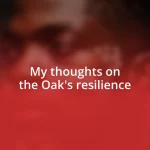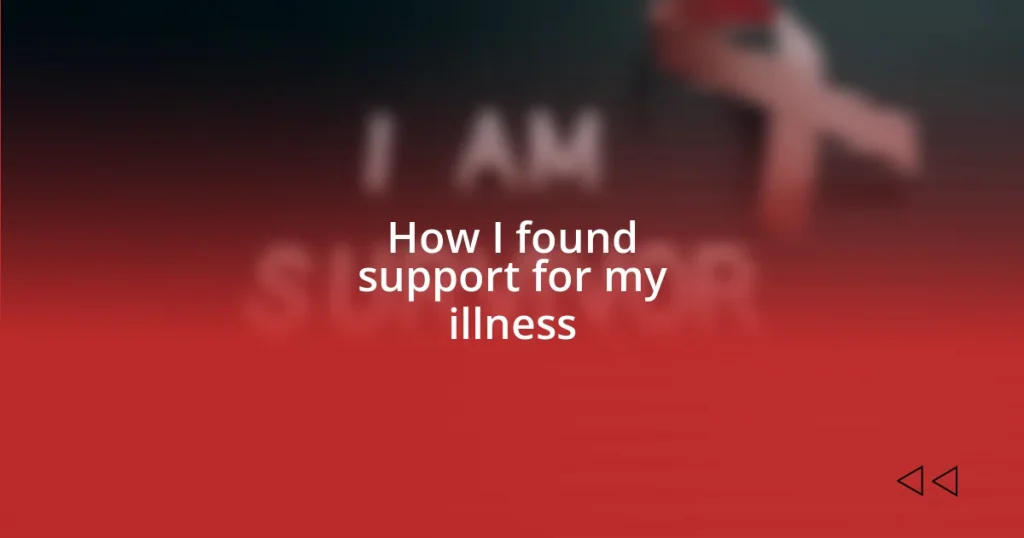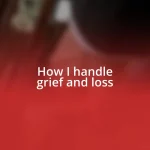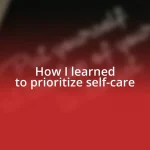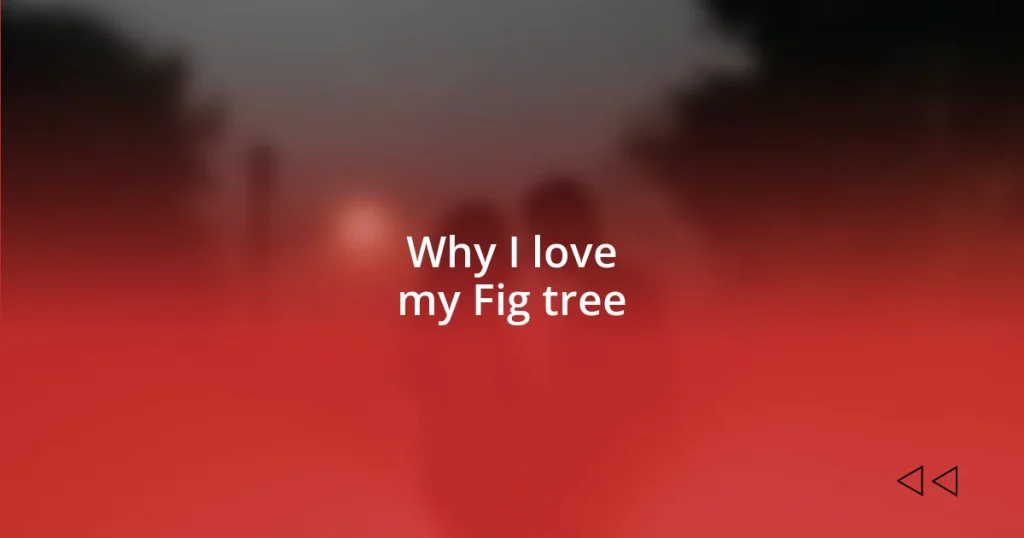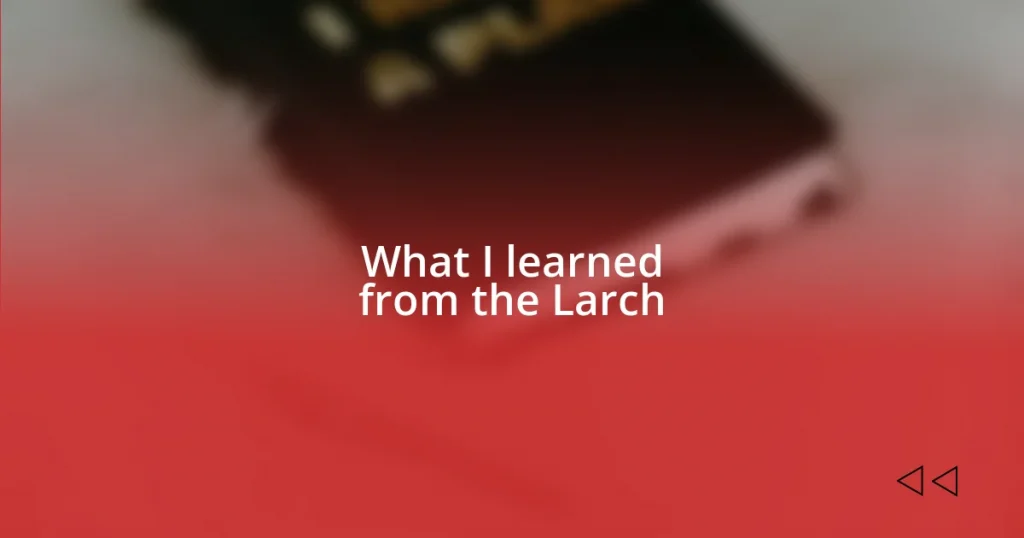Key takeaways:
- Education and understanding of one’s illness empower emotional clarity and promote healing.
- Recognizing the need for support transforms feelings of isolation into community connection, offering both emotional and practical resources.
- Sharing personal experiences fosters unity and encourages open dialogue, benefiting both the speaker and the listeners in their healing journeys.
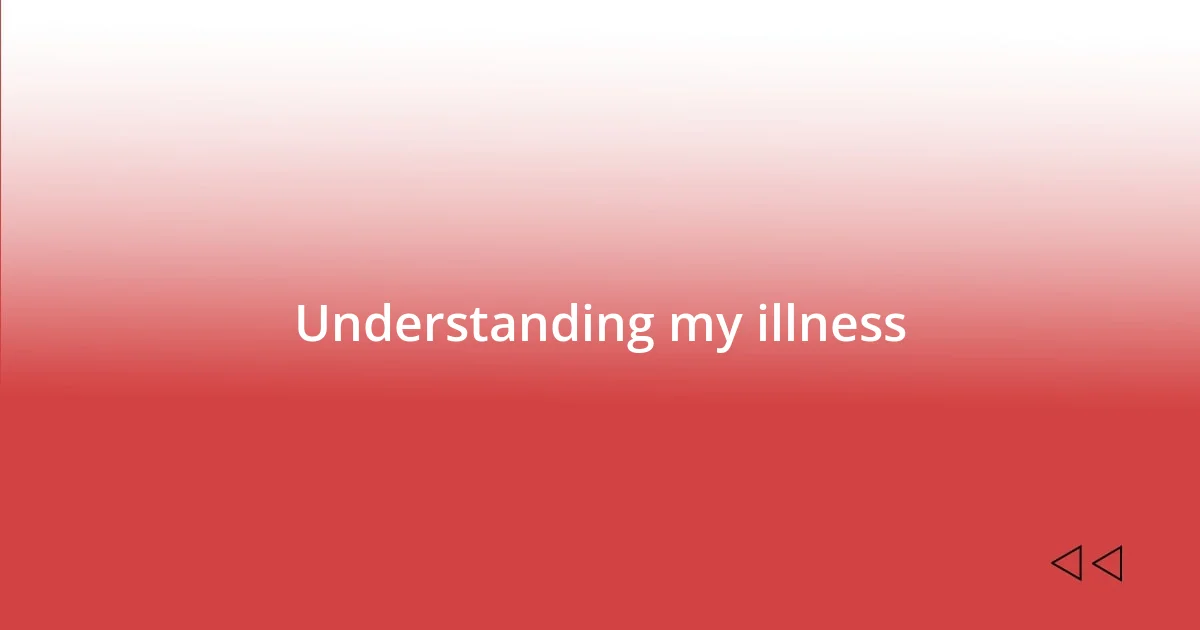
Understanding my illness
Understanding my illness has been quite a journey. In the early days, I often found myself overwhelmed by the symptoms that seemed to come out of nowhere, leaving me feeling vulnerable and confused. Have you ever felt like your body was betraying you? That’s how I felt, grappling with the reality of my condition while trying to make sense of it all.
As I dug deeper into the nature of my illness, I discovered that education is empowering. I remember sitting at my kitchen table, surrounded by books and articles, a cup of tea in hand, feeling both determined and anxious. It was enlightening to learn about the mechanics of my illness; suddenly, I wasn’t just a label but a person navigating a complex, intricate condition. How could I have been so unaware of what was happening in my own body?
My emotions have played a significant role in my understanding, and I learned that it’s okay to feel frustrated or scared. There were days when I cried for hours, pounding the pillows, feeling stuck in a body that didn’t feel like mine. Through this, I eventually learned that acknowledging these emotions was a crucial part of understanding my illness. Have you recognized the importance of your feelings in your own health journey? I believe that embracing our emotional responses can often lead to deeper insights, transforming confusion into clarity.
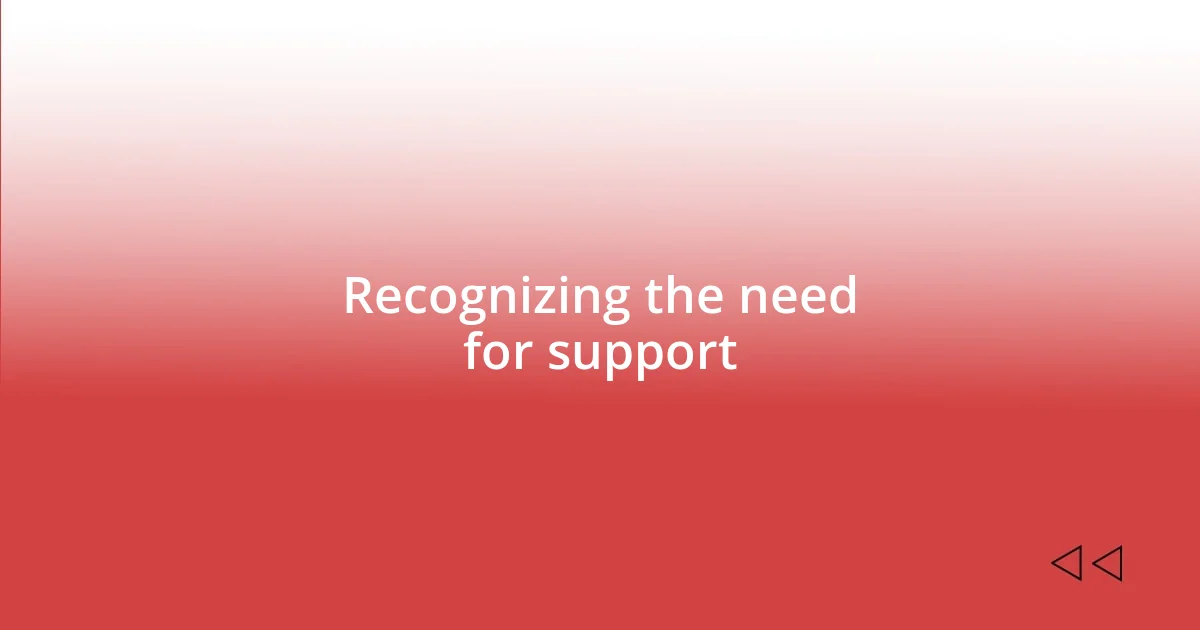
Recognizing the need for support
Recognizing the need for support is a significant step I had to take in my journey. At first, I was hesitant to reach out, believing I could handle everything on my own. But I vividly remember a day when I was sitting on my bed, feeling utterly defeated. I realized that trying to shoulder my burden alone only intensified my feelings of isolation and despair. It dawned on me that seeking help wasn’t a sign of weakness but a courageous move towards healing.
As time went on, I understood that support can come in many forms—friends, family, or even support groups. I took a leap of faith and joined an online community. Initially, I felt like an outsider, reading others share their experiences, but slowly, as I began to share my own stories, I felt a warmth of connection that reminded me I wasn’t alone. Have you ever felt the thrill of knowing others understood your struggles? It’s a remarkable feeling that can help bridge the gap between loneliness and community.
Ultimately, recognizing the need for support can spark a transformative journey. Whenever I thought about opening up, I felt a mix of anxiety and hope. I often asked myself, what if they don’t understand? But I soon learned that vulnerability opens doors to genuine connection. It was through sharing my fears and triumphs that I found not just solace but also valuable insights from others who had walked similar paths. Support, I found, was as much about exchanging experiences as it was about emotional comfort.
| Support Type | Description |
|---|---|
| Emotional Support | Connecting with friends or family to share feelings and experiences. |
| Practical Support | Assistance with daily tasks or challenges encountered due to illness. |
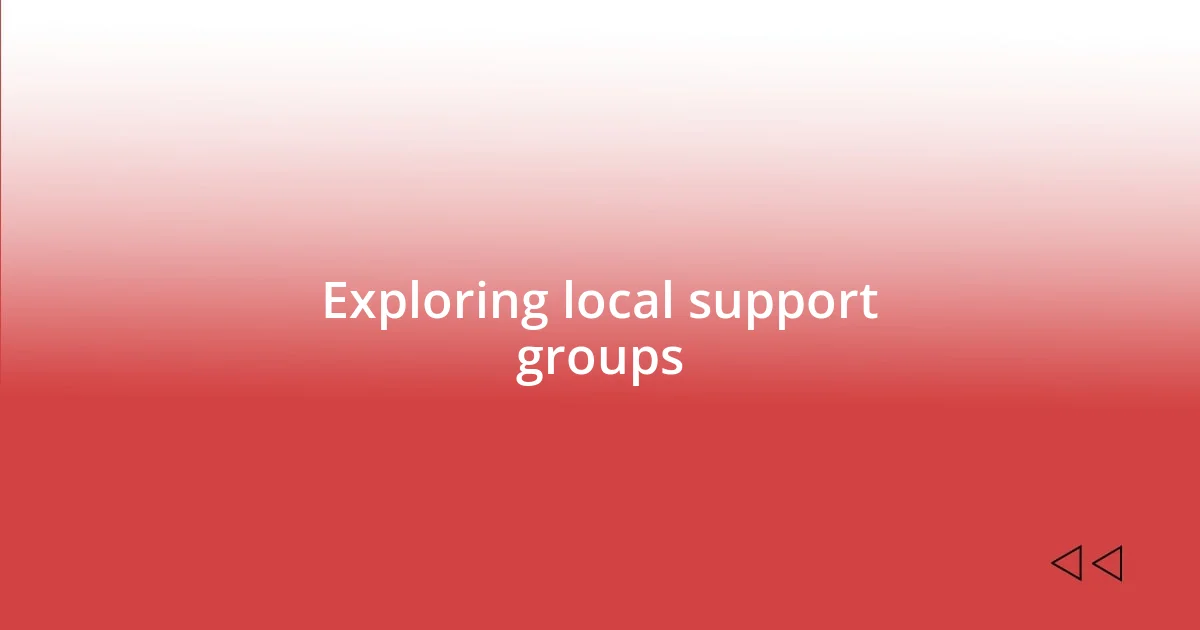
Exploring local support groups

Exploring local support groups
When I began searching for local support groups, I felt both excited and nervous. The idea of connecting with others who shared my experience was appealing, yet I worried about the stigma. I remember walking into my first meeting, heart racing, and being greeted by a room full of welcoming faces. It was a reminder that reaching out for help can lead to unexpected sources of strength, reassurance, and friendship.
While exploring these groups, I uncovered various benefits that made the experience worthwhile:
- Shared experiences: Listening to others’ journeys felt validating, reminding me that my feelings were normal.
- Expert guidance: Many groups included guest speakers, from healthcare professionals to wellness coaches, who provided valuable insights.
- Social connections: I forged friendships with people who truly understood my challenges, forming a network I could rely on.
- Emotional healing: The group setting created a safe space for expressing feelings and discussing fears openly.
In addition to the emotional support, I discovered practical resources as well. One evening, while sipping tea and sharing my journey during a group session, a member suggested a local therapist specializing in my illness. Taking her advice changed my approach towards managing my condition, as I learned new coping strategies that complemented the support network I was building. Have you ever stumbled upon a piece of advice that altered your path completely? I certainly have, and it’s moments like these that truly highlight the power of community and shared wisdom.
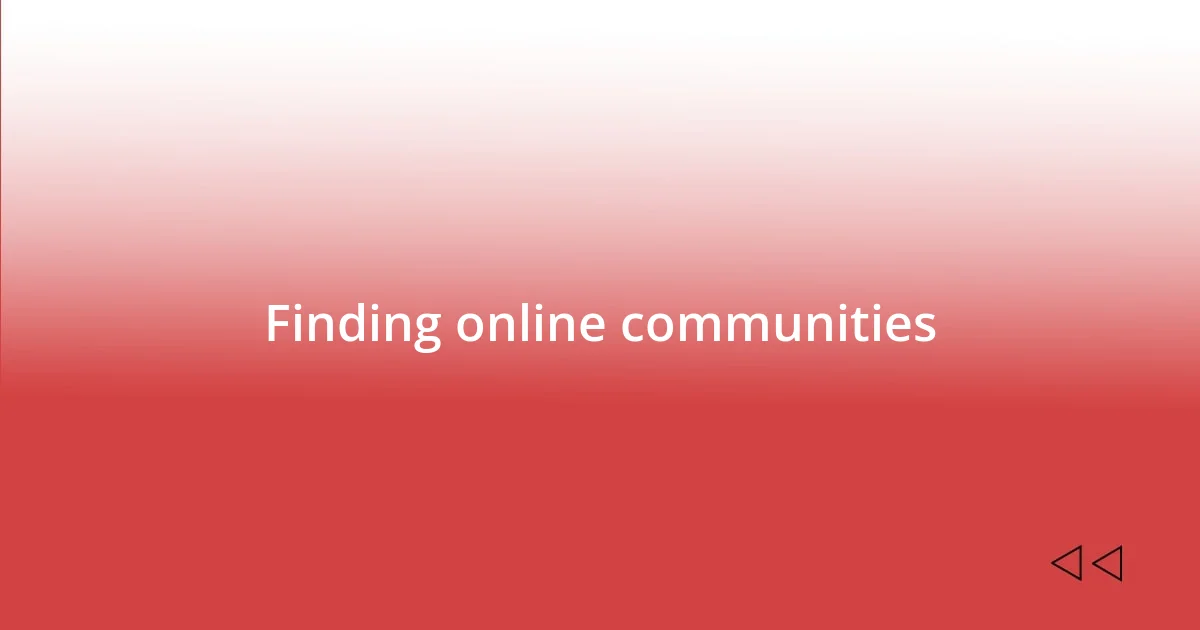
Finding online communities
Finding online communities was a pivotal moment for me. Initially, I felt overwhelmed by the sheer number of groups and forums available, questioning whether I would find my place among strangers. However, after joining a few dedicated platforms, I quickly discovered that vulnerability thrives in these spaces. There was something incredibly reassuring about sharing my thoughts and feelings, while others reciprocated with their own experiences. It felt like a collective sigh of relief—did you ever wish to be understood without having to explain everything?
What struck me most was the sense of camaraderie in these online groups. Members were quick to offer support, sharing advice tailored to our specific illness. I remember feeling particularly low one evening when someone shared a coping strategy that completely shifted my perspective. It was a simple tip, yet it felt monumental—like finding a long-lost key to unlock a door I didn’t know was closed. Isn’t it amazing how a few kind words from a stranger can help illuminate the path forward?
As I navigated through these digital spaces, I also met people with diverse backgrounds, each bringing unique insights based on their journeys. I often found myself engrossed in threads discussing not just survival tactics but also moments of joy amid the struggles. This exchange reminded me that even in our darkest times, laughter and connection were entirely possible. Have you ever felt the warmth of laughter when sharing a tough story? That connection is the essence of building a supportive community, and it reaffirmed that I wasn’t alone on this journey.
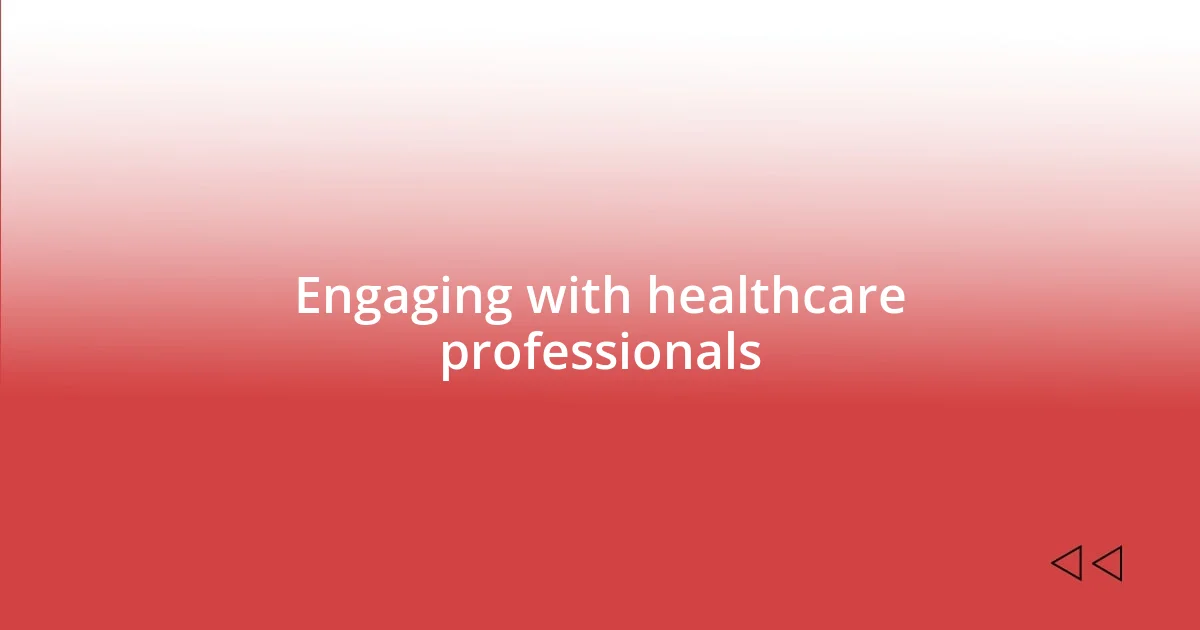
Engaging with healthcare professionals
Connecting with healthcare professionals was an eye-opening experience for me. At first, I felt a bit unsure about how to approach them, but I learned that being open and honest about my challenges is crucial. I remember sitting in a doctor’s office, sharing my symptoms and fears, only to discover that many professionals truly want to help. Has there been a time when you hesitated to voice your concerns with a doctor? I definitely have, and I’ve come to realize that these conversations can pave the way for better care and understanding.
Finding the right healthcare professional was also a journey in itself. I sought out specialists who not only understood my illness but also shared a passion for education and empowerment. One afternoon, after a particularly candid discussion with my therapist, I felt a wave of relief wash over me. It was refreshing to engage in a dialogue that wasn’t just about my diagnosis, but about my overall well-being. Do you sometimes wish for a deeper conversation with your healthcare providers? I discovered that those moments of clarity often lead to actionable insights and a stronger partnership in managing my illness.
Moreover, I’ve learned that advocating for myself plays a significant role in my relationship with healthcare professionals. In one appointment, I took a list of questions and concerns I had prepared in advance. I could sense the surprise on the doctor’s face, but what unfolded was a rich discussion about treatment options I never knew existed. Isn’t it empowering to take control of your healthcare narrative? Each time I engage proactively, I see how much more tailored my care becomes, reminding me that my voice truly matters in this process.
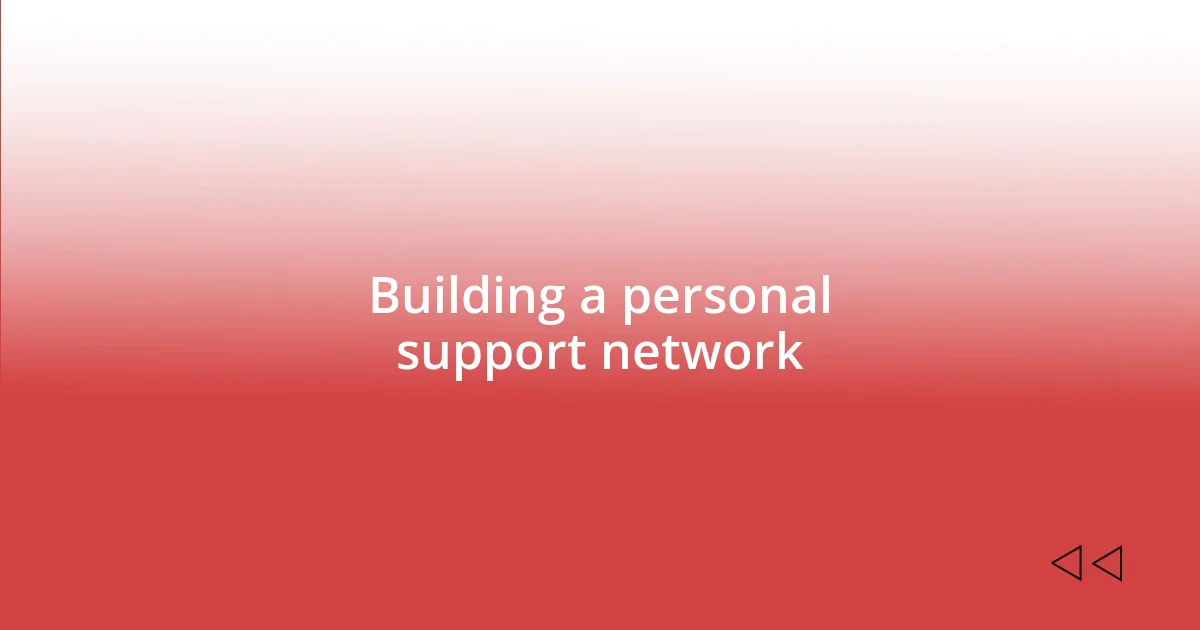
Building a personal support network
Building a personal support network has been a transformative experience for me. I remember the first time I reached out to friends and family, feeling a mix of anxiety and hope. It was challenging to share my vulnerabilities, but when I did, I was met with unexpected warmth and understanding. Have you ever worried about burdening others with your struggles? I discovered that so many people wanted to listen and help, which surprised me and deepened our connections.
I found that diversifying my support system was essential. Not only did I lean on my closest friends, but I also began attending local support groups. Just the other week, I participated in a meeting where members shared their personal stories, and I felt an instant bond with a woman who faced similar challenges. Isn’t it incredible how shared experiences can create such strong ties? Those gatherings have become a source of encouragement for me, turning shared struggle into collective strength.
Nurturing these relationships required effort, though. I made it a point to check in with my support network regularly, and I even set reminders to reach out. One time, I was feeling especially down, and a simple text message to a friend led to a long chat filled with laughter and understanding. That moment reminded me that we all have the capacity to uplift one another. Doesn’t it feel good to know that your support can light up someone else’s day? Creating these connections has not only helped me cope with my illness, but it has transformed the way I view my journey, paving the way for healing and hope.
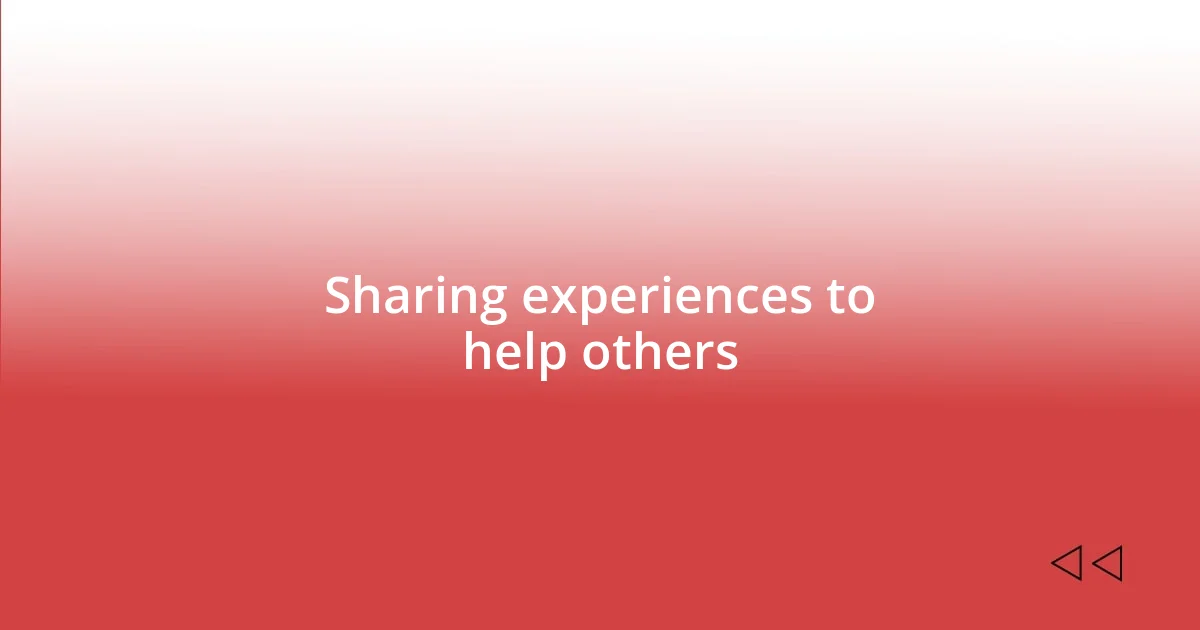
Sharing experiences to help others
Sharing my experiences with others has been an enlightening process. I recall a pivotal moment when I decided to speak at a local seminar about my journey. The room was filled with attentive faces, and I felt an overwhelming sense of connection as people nodded along, sharing their own struggles in return. Have you ever felt that spark of unity in a group? It was in that moment I realized how powerful it is to open up; we’re often more alike than we think.
I discovered that by sharing my story, I not only helped others but also found clarity for myself. There was a time when I wrote a blog post detailing my coping strategies for anxiety. What surprised me was the flood of messages I received from readers who felt seen and understood. Have you ever struck a chord with someone just by being honest? It made me appreciate how our vulnerabilities can foster healing, not just for ourselves but for those who resonate with our experiences.
The act of sharing is truly transformative. Once, during a casual conversation with a coworker, I shared my journey with depression and mentioned some practices that had helped me. To my astonishment, they revealed their own battles and how they’d been searching for resources. Isn’t it remarkable how one conversation can ignite a deeper dialogue? These exchanges remind me that by embracing our stories, we encourage others to do the same, creating a ripple effect of support and understanding.






